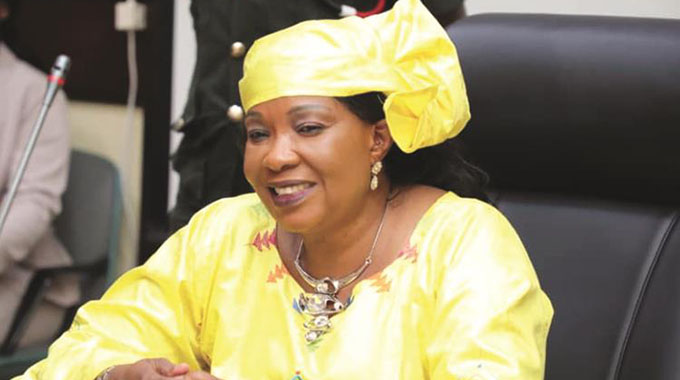‘Breastfeeding way to go’

Tendai Rupapa and Joseph Madzimure
THE rise in marketing of breast milk substitutes influences social norms and contributes to wrong perceptions that formula use is better than breast milk, Health and Child Care Ambassador First Lady Auxillia Mnangagwa has said.
Speaking at the official launch of the 2020 National World Breastfeeding Week, which runs from August 1 to 7, the First Lady called for the adoption of stricter regulatory frameworks coupled with independent, quantitative monitoring and compliance enforcement to counter the impact of the marketing of breast milk substitutes.
This year’s commemorations are running under the theme; “Promoting Breastfeeding for a Healthier Planet.”
World Breastfeeding Week is an annual celebration held every year in August in more than 120 countries. Breastfeeding can help reduce a baby’s risk of infections, with fewer visits to hospital as a result.
According to experts, breast milk is nature’s perfect baby food because it contains immunity-boosting antibodies and healthy enzymes that scientists are yet to replicate.
The First Lady said for the country to achieve Sustainable Development Goals, breastfeeding should be at the core of efforts aimed at achieving these targets by 2030.
“Breastfeeding has been shown to save over 800 000 children’s lives a year worldwide, equivalent to 13 percent of all deaths in children under two, and prevent an extra 20 000 deaths from breast cancer every year,” she said.
The First Lady who has a passion for the welfare of women and children, described breastfeeding as a sustainable feeding option.
“It plays a crucial role in protecting the climate and environment. Climate change and environmental degradation are some of the most urgent challenges facing our world today.
“Emissions of greenhouse gases (GHG) — including carbon dioxide, nitrous oxide, methane and others due to human activity — have increased global temperatures by over 1 degree since pre-industrial times.
“Our food production systems and consumption patterns are significant contributors to climate change and environmental degradation.
“I want you to imagine the amount of air pollution that takes place during production, packaging, distribution and preparation methods of infant formula. On the other hand, breast milk production only requires the additional food that a mother needs to consume, therefore, using fewer natural resources and resulting in almost no waste.”
In Zimbabwe, the First Lady said, breastfeeding was recognised as a universal action, but today’s mothers were letting down future generations.
The Ministry of Health and Child Care, said the First Lady, now talks of the need to provide a warm chain of support or continuum of care from the time a woman is pregnant until the child reached two years.
“That also means our Government still has a lot of homework to do. Imagine those mothers who go back to work after three months’ maternity leave with small babies, and we expect them to practice exclusive breastfeeding until six months.
“So, where does the warm chain of support come in? It means companies and employers have to create family-friendly workplaces where mothers have spaces to express and store their breast milk for feeding later when they go back home. Some companies are doing well on this, like Lafarge Cement Company, Chogugudza Primary School and others.”
The Parliamentary Women Caucus, the First Lady said, was putting forward a motion in Parliament that calls for support for breastfeeding women.
“It means an honourable member can leave the Parliament chambers and go to a private room where they can express and store their breastmilk for feeding their child later,” she said.
“This is a commendable step by the Parliamentary Caucus for Women. If Parliament can do it for honourable members and their employees, then most companies can do it as well. We need to support mothers, at home and at work!
“I am very happy to see that as country we are promoting a sustainable intervention. This intervention is critical in complementing other approaches being implemented in Zimbabwe to prevent and correct malnutrition in children below the age of two years.
“A lot of investment needs to go into nationwide, active social marketing and nutrition behaviour change communication to raise awareness on the magnitude of the problem of low breastfeeding rates in the country and its consequences on the health and development of the nation.”
Amai Mnangagwa applauded and encouraged collaboration between the Government and its development partners to ensure a healthy nation.
“Let us work together towards a Zimbabwe free from hunger, poverty and malnutrition,” she said. “Let us promote breastfeeding for a healthier planet!”
The First Lady, who has traversed the length and breadth of the country disseminating information on Covid-19 prevention, called for cleanliness to keep the disease at bay.
“Some people are asking how they will breastfeed against the backdrop of Covid-19,” she said.









Comments